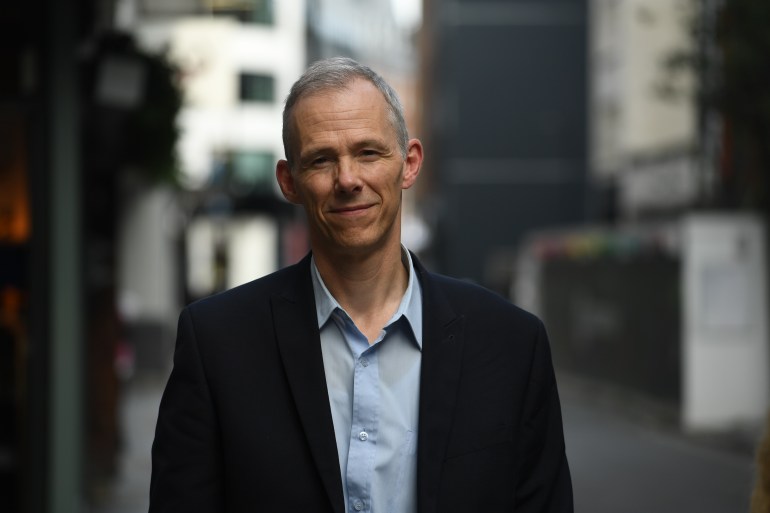London, England – The UK is expected to hold a general election in the second half of 2024 and Rishi Sunak, the leader of the UK Conservatives, is under pressure.
The right-wing party, which has ruled Britain for more than a decade, is far behind the main opposition Labor Party in the polls.
Earlier this month, a YouGov poll of about 14,000 people published by The Telegraph newspaper predicted Labor could win 385 parliamentary seats. The Conservatives are on track to retain just 169 seats, a bigger loss than in 1997 when Labour’s Tony Blair triumphed over John Major.
On the world stage, observers say Sunak’s decision to join the United States in the sights of the Yemeni Houthis in retaliation for their attacks in the Red Sea and his refusal to call for a ceasefire in the Gaza Strip could affect his approval ratings.
Al Jazeera spoke to Tim Bale, a politics professor at Queen Mary University of London, about the upcoming election, the challenges facing Sunak, 43, and Labor’s chances.

Al Jazeera: Sunak faces multiple crises. As he has problems with an offer to deport refugees there Rwanda, The war in Ukraine is still raging, as is Israel’s attack on Gaza. Is he the right person to lead UK foreign policy and government at this time?
Tim Bale: I think it’s fair to say he’s a smart guy. He’s a hard-working guy. So he’s probably as knowledgeable on all issues as a Prime Minister could be.
I think his problem on the world stage is that very few of those he speaks to expect he will be there this time next year, which means his influence is inevitably less than it would otherwise be.
At home he suffers from the same problem as I think any solutions he proposes or any measures he takes are always seen as temporary and not future British policy.
Al Jazeera: Many British Muslims and pro-Palestinian Brits say they are disillusioned with the two main parties, as neither has loudly called for a permanent ceasefire in Gaza. What impact will this have on the Conservatives come election time?
Bale: I think it is very unlikely that it will have any impact on the Conservative vote, as very few people who would be upset about the war in Gaza, certainly not on the Muslim side, will support the Conservatives anyway. Their share of the vote among Muslim voters is generally very low.
It’s possible that if we were to become embroiled in a broader conflict in Yemen, for example, and had to send more troops to that theater, I think the public would react very strongly against this government and that government.
In relation to Labour, much has been written about the threat posed by some Labor MPs who represent constituencies with very high Muslim populations.
But very often they have very, very large majorities. Even if there are some people in these constituencies who care deeply about Gaza and therefore vote against Labor, they probably have enough of a cushion to survive.
Furthermore, it is somewhat reductive to claim that voters with an Islamic faith are defined solely by that faith. They also have to operate in an economy suffering from a cost of living crisis.
Al Jazeera: What are Sunak’s priorities as we start the new year?
Bale: The obvious thing is this Stop the boats problem and the ability or inability of the government to actually stop people coming across the Channel to claim asylum.
The other problems are perennials [like] the state of the economy. Some people are now suspecting that Britain will fall into recession before the election, which is never a good thing for a government.
Obviously inflation is coming down, but perhaps not quite as quickly as people would like.
People are still suffering from the cost of living crisis they have been in for a year or two.
The other big problem that the government appears unable to do anything about is the state of the National Health Service, the huge waiting lists and the difficulty of finding one [family doctor].
One possibility towards the end of the year will be the US elections and the extent to which Donald Trump supports Rishi Sunak or not.
The possibility of Trump being elected before we hold an election will make people feel that the world has suddenly become more unstable and therefore they may be more inclined to vote for the current administration rather than a new option.

Al Jazeera: Election polls point to an electoral defeat for the Conservative Party, a defeat not seen since 1997. Is that likely?
Bale: It is very difficult to imagine a government that is so far behind in the polls at this stage of the election cycle, with a Prime Minister who is relatively unpopular, presiding over an economy that is at best in shambles and an NHS that is This does Most people seem to believe that if you fall apart you can win an election.
Clearly Labor has a big mountain to climb because they did so poorly last time. You have to win a lot of seats to win a majority.
But I think that seems entirely possible now. Still, I think the predictions of a landslide are probably exaggerated.
Al Jazeera: What trends are we seeing in the early polls, particularly among Brits who have traditionally voted Labor but switched to the Conservatives in the 2019 election?
Bale: It is clear that the Conservative Party has lost a lot of support in the seats it took from Labor. Partly because [ex-UK PM] Boris Johnson was very popular, also because [ex-Labour leader] Jeremy Corbyn was very unpopular, partly because these seats were strongly pro-Brexit.
With Brexit now somewhat in the rearview mirror, it is less of an issue for these voters and more concerned with the sort of bread-and-butter issues like the economy and the NHS.
One would expect many of these seats to revert to Labor given how poorly the government has handled these particular issues.
The government also has problems with the so-called blue wall seats (which are loyal to the Conservatives).
These are seats in the south and east that are slightly wealthier. [The Conservatives are] A very hard line on immigration, “woke” and all of these things are not popular with well-educated people who often live in these affluent areas.
Generally speaking, [the trends] show that many people see the government as exhausted, lacking ideas and too right-wing – and that doesn’t really bode well for their electoral chances.
Al Jazeera: What can we expect from a government under Labor leader Keir Starmer and the impact on European politics?
Bale: I think that’s the $64,000 question in some ways because Keir Starmer and Rachel Reeves, the shadow chancellor, have put forward a very cautious campaign.
They don’t offer much more editions. They don’t really see eye to eye with people [on the] Taxes needed to help public services recover from the decade or so of austerity we have experienced.
I suspect that the Labor government would be a bit more radical and more willing to spend money than people think and increase taxes.
In terms of implications for European politics, Europe generally appears to be moving to the right.
If a Labor government were elected, it would at least give some people in Europe hope that it is not completely impossible for a centre-left government, a bunch of social democrats, to come to power.
Al Jazeera: Will the climate crisis be an election issue?
Bale: What is very urgent is the climate emergency. Although Labor have talked about some sort of large green investment fund, I think they are likely to play this down because they are concerned about criticism from the Conservatives about the costs of this program.
But if someone were to look back on this election in 50 years, when the planet will be much warmer and we will suffer all sorts of consequences from it, they might well ask themselves: Why were they talking about fairly trivial things? When the world burns?
This interview has been lightly edited for clarity and brevity.






Recent Comments